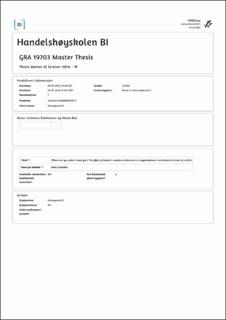| dc.description.abstract | Interpersonal workplace conflict is an eminent part of organizational life and affects employees at all organizational levels. Previous research on the topic supports the notion that leaders play a particularly important role in managing such conflicts, and further suggests that leaders’ conflict management behaviors affect important individual and organizational outcomes. In light of this, the association between interpersonal workplace conflict and employee organizational commitment was investigated within the framework of the present master thesis. Secondly, the master thesis examined a potential moderating effect of leaders’ avoiding conflict management behavior on the described association. Thirdly, it explored a potential three-way interaction between interpersonal workplace conflict, leaders’ avoiding conflict management behavior, and employees’ need for leadership. The findings of this quantitative, cross-sectional study were only partly consistent with previous theoretical assumptions. While confirming the significant negative effect of interpersonal workplace conflict on organizational commitment, the hypothesized negative moderating effect of leaders’ avoiding conflict management behavior was not significant. When including employees’ need for leadership as an additional moderator, the hypothesized three-way interaction was significant. In our implications, we point to the necessity to assess individuals’ need for leadership which offers a reflection of the value of leadership as a resource for them. We further highlight that the effect of leaders’ avoidance behaviors is contingent on the discrepancy between leadership needed and leadership supplied. Based on this novel insight, we call for an extension of the literature on third-party conflict management and laissez-faire leadership to reflect the relevance of assessing need for leadership. | en_US |
